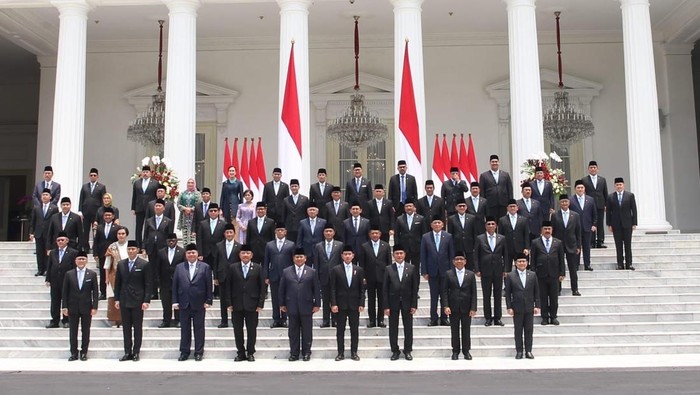Independent research institute IndoStrategi has released the results of its performance evaluation of ministries during the first year of President Prabowo Subianto and Vice President Gibran Rakabuming Raka’s administration.
The study highlights 10 top-performing ministries that played strategic roles in implementing the government’s Asta Cita priority programs, with four ministers standing out for their crucial contributions to economic stability, food security, education, and bureaucratic reform.
“They are the driving force in maintaining economic stability, food resilience, education, and bureaucracy, and serve as benchmarks for the Cabinet’s performance in the first year of Prabowo–Gibran’s leadership,” said Indonesia Presidential Studies (IPS) Research Director Arman Salam in a written statement on Sunday (Oct 19, 2025), as quoted by Detik.
The four standout ministers are:
- Finance Minister Purbaya Yudhi Sadewa, praised for fiscal and budget management, economic stability, and clear, pro-people communication.
- Agriculture Minister Amran Sulaiman, recognized for his focus on food self-sufficiency, price stabilization, and strengthening national food security.
- Home Affairs Minister Tito Karnavian, described as the “bureaucracy commander” for overseeing local governance, inflation control, housing programs, and public health initiatives, including tuberculosis eradication and the placement of specialist doctors in public hospitals.
- Minister of Primary and Secondary Education Abdul Mu’ti, credited with improving education quality to support Indonesia Emas 2045, though further systemic reforms are needed to meet global standards.
Arman warned that the challenges ahead will become more complex, urging stronger coordination across government levels.
“Do not give room to oligarchs looking to stir the waters. Firm leadership from the president and law enforcement is crucial for a more advanced and prosperous Indonesia,” he emphasized.
IndoStrategi Survey: Education Ministry Tops the List
The IndoStrategi survey, conducted from early September to October 13, 2025, involved 424 respondents from 34 provinces, including activists, teachers, lecturers, entrepreneurs, and postgraduate students. Respondents were selected purposively, and the study used a combination of interviews, media analysis, government documents, and academic input.
According to Kompas, here is the Top 10 ministries ranking:
- Ministry of Primary and Secondary Education (Abdul Mu’ti) – 3.35
- Foreign Affairs Ministry (Sugiono) – 3.32
- Religious Affairs Ministry (Nasaruddin Umar) – 3.26
- Ministry of Higher Education, Science, and Technology (Brian Yuliarto) – 3.22
- Agriculture Ministry (Amran Sulaiman) – 3.21
- Finance Ministry (Purbaya Yudhi Sadewa) – 3.15
- Home Affairs Ministry (Tito Karnavian) – 3.14
- Defense Ministry (Sjafrie Sjamsoeddin) – 3.13
- Forestry Ministry (Raja Juli Antoni) – 3.08
- Investment Ministry (Rosan Roeslani) – 3.08
“Based on our research, the Ministry of Primary and Secondary Education under Minister Abdul Mu’ti ranks first with a score of 3.35,” said IndoStrategi Research Director Ali Noer Zaman at a press conference in South Jakarta on Friday (Oct 17, 2025).
Ali highlighted that the top score reflects innovations in teacher redistribution, performance systems for teachers and principals, and new student admission systems.
“Deep learning and coding initiatives are recognized as adaptive steps for the digital era. The redistribution of civil servant teachers addresses education quality gaps across regions,” Ali explained.
Ministries with the Lowest Scores
The survey also found that some ministries lagged behind. Energy and Mineral Resources Minister Bahlil Lahadalia ranked the lowest with a score of 2.74, followed by Minister of Housing Maruarar Sirait (2.77) and Minister of Human Rights Natalius Pigai (2.79).
Overall, most ministries earned “moderate” performance ratings, reflecting the transitional phase from the previous administration to Prabowo’s policy consolidation.
Source: Detik, Kompas, SindoNews
Photo Credit: kemendagri


